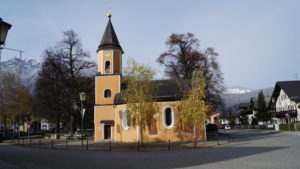Catholicism is often described as an “incarnational religion”. On several fronts, this presents a huge paradigm shift from Protestant Christianity to include non-denominational Bible Christianity.
In the first place, the word religion is not considered a negative term in the Church as it is in other traditions—specifically Bible churches. Apparently, no one likes to be called “religious” these days and modern, so-called relevant, Christians like to distance themselves from “organized religion”. The far edge of this thinking lays claim to being spiritual but not religious which means no one tells me what to believe. Gaze at your own navel, meditate on your own breathing, but don’t stand on the shoulders of giants like St. Paul, St. Jerome, St. Augustine, St. Thomas Aquinas, and other byproducts of so-called organized, systematic, developed r***g**n.
But the Bible is not inimical to the idea of religion (a particular system of faith and worship), detailing such from cover to cover. The Epistle of James even mentions the word religion, specifically that which is vain versus that which is good:
James 1:26 If any one thinks he is religious, and does not bridle his tongue but deceives his heart, this man’s religion is vain. 27 Religion that is pure and undefiled before God and the Father is this: to visit orphans and widows in their affliction, and to keep oneself unstained from the world.
So religion per se is not bad, and avoiding the word “religion” in matters of faith and morals is like an atheist avoiding the word “design” in matters of life. It’s absurd.
So what is this “incarnational religion”?
The word incarnational describes the divine manifested in the physical world, specifically manifested in human flesh. It is derived from the same vocabulary as “carnivore” (flesh eating), “carnival” (indulging the flesh), and, lest we forget, “chili con carne” (chili with meat).
When the New Testament speaks of the Word (Jesus Christ) becoming flesh, specifically in John’s Gospel and Letters, it references the doctrine practically unique to Christianity—that God became Man at a verifiable point in space and time. This mystery has been pondered, debated, wrangled, and even rejected over the course of millennia—a difficult teaching to accept by our finite, faithless and fallen world:
John 1:1 In beginning was the Word, and the Word was with God, and the Word was God. 2 He was in the beginning with God; 3 all things were made through him, and without him was not anything made that was made. 4 In him was life, and the life was the light of men. 5 The light shines in the darkness, and the darkness has not overcome it. …9 The true light that enlightens every man was coming into the world. 10 He was in the world, and the world was made through him, yet the world knew him not.
The Church repeats this mystery in many of her prayers and liturgical formulas. At this point of the Credo, all are to bow:
et incarnatus est de Spiritu Sancto ex Maria Virgine, et homo factus est. (and he became flesh by the Holy Spirit out of the Virgin Mary, and he was made man)
immediately followed by
crucifixus etiam pro nobis sub Pontio Pilato (also he was crucified for us under (the rule of) Pontius Pilate)
Not to specifically disrespect Pontius Pilate but to draw attention to the incarnation of God Almighty being not some vague event that happened in the minds of anonymous myth-makers but a point in world history that can be reckoned by anyone with a calendar. The Roman Empire existed, the governor of Judea existed, and Pontius Pilate was known to exist even memorialized by a marble block found in Caesarea inscribed with his unfortunate name: PONTIVS PILATVS.
Later in the Mass, the priest will elevate the fracture host toward the people and proclaim
Ecce Agnus Dei, ecce qui tollit peccata mundi. Beati qui ad cenam Agni vocati sunt (behold the lamb of God, behold he who takes away the sin of the world. Blessed are they that are called to the supper of the lamb)
We hear it, we see it, and soon thereafter we will gnaw upon the body and blood of Christ—yes, a very incarnate religion.
In numerous other ways, the liturgy of the Mass draws from the physical aspects of the world be it water, wine, oil, bread, incense, iconography, statuary, architecture, stained glass, images, bells, chant, vestments, candles, fire, gold, metal, cloth, gesture, touch—-all the physical senses engaged—and likely why they were created. In fact, Catholic thought, teaching, and sacramental life draw from the properties of our temporal world to include marriage, sexuality, harvest, agriculture, seasons, calendar, ritual, language, and human culture.
The bottom line: Catholicism recognizes the world as not something that is simply “fallen” and thereby “worthless” but draws from nature and the works of the Creator as inherently good. After each act of creation in Genesis, we read “And God saw that it was good”—not wicked, not disposable, not deplorable. Furthermore, creation serves as the instruments of worship and the primary reason why it and we were created in the first place. Intelligent human beings are the ones qualified to worship God since true worship requires an independent act of one’s directed will. The sacrificial system of worship that fell to the fallen world (via Israel) required material offerings as well as spirit, words, and deed. And the sacrifice of the Mass presents none other than the acceptable body, blood, soul and divinity of the unblemished INCARNATE Christ. The Eucharist is the physical sign of the New and Everlasting Covenant which followed the material signs that marked all previous covenants: Sabbath (Adamic), rainbow (Noahic), circumcision (Abrahamic), Passover (Mosaic), kingdom (Davidic) all of which miraculously persist in the modern world.
This incarnational property of the Catholic Church allows it to regard wine, beer, whisky, tobacco and gambling as things that are not inherently bad but properties of God’s “good” creation that, like sex and eating, can be enjoyed as gifts or misused in sin.
Because of this aspect, the Church is often indicted on the grounds of hailing from pagan influence. But where exactly does the counter idea originate, the idea that the temporal physical world, the flesh, the body, etc. is bad? It is a pagan idea and a perspective, I will argue, that finds certain harbor in Protestant Christianity.
Enter ancient Greece. The Greek version of a beatific vision sought to liberate man from the prison of his body which the Greek equated with the world and with death. The purpose of pagan Greek religion was to release the soul imprisoned in the tomb of the body constrained by worldly distractions. And the purpose of the ancient Greek was to make sure everyone complied through oppressive taxation and cultural subjugation (ref: Democrat party). Whatever Hellenizing sought to do philosophically, the policy began to unify the ancient world in language and culture in the wake of Alexander the Great.
So what does that sound like? Catholicism or Protestantism? When we cast away the trapping of the world including our own human body and souls as inherently wrong or evil, this teaching, over time, evolved to eliminate from Christian Europe and the West many things including:
- Sacraments (other than baptism)
- Iconography (Reformers destroying churches in the 16th century) and the desolation of monasteries (Henry VIII).
- The crucifix without a corpus
- Transubstantiation
- Wine (commercially substituted by Welch’s grape juice, still)
- Any effort toward a temporal righteousness involving deeds (the arm of the flesh).
[ Added Oct 17 ] Here is a quote from Hillaire Belloc’s Characters of the Reformation. In this segment on Oliver Cromwell, Belloc defines the new Protestant faction of Puritanism:
The sentiment rather than the conviction that the material world is evil, and therefore that all sensual joy is in essence evil, lies at the root of Puritanism. Joy in the arts, delight in beauty, and the rest of it, are the Puritan’s object of hatred. He sees them all as rivals to the majesty of God and obstacles which deflect the pure worship of that majesty. It has been remarked as a curious by-product of Puritanism that it threw men back on to the pursuit of wealth as their main occupation. It is from Puritanism that we derive modern industrial capitalism, the centralization of wealth in a few hands, the dispossession of the masses and their exploitation by a small number of those who control the means of production; all that we call Capitalism.
As another postscript, I wonder if the surge in New Age religions, Wicca or the popularity of Magic in media (Harry Potter, Once Upon a Time, Merlin) is due in part to a suppressed human need to incorporate the material world in worship and in religion. In any case, relegating the physical world to the domain of inherent evil is inherently false and inherently pagan.



